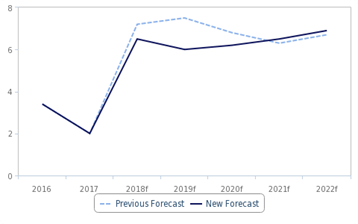Start 14-Day Trial Subscription
*No credit card required

Nigeria's Alcohol Market Affected by New Excise Taxes
According to BMI Research (a unit of Fitch Group), Nigeria's new excise taxes on beer, wine and spirits has affected the country's projected growth in the market -- slowing growth considerably, but not crippling the industry's long-term outlook in the country.
To defend against these taxes, Nigerian companies will look to cut costs by refocusing production in other markets in West Africa, and by investing in local, cheaper ingredient sources. The full report from BMI Research on this issue is below.
Industry Trend Analysis - Revised Excise Duties A Risk To Nigeria Alcohol Sector But Not Ruinous
Nigeria Food & Drink
Key View:
 We have revised down our growth forecasts for Nigeria's alcoholic drinks sector following the implementation of higher excise duties on beer, wine and spirits.
We have revised down our growth forecasts for Nigeria's alcoholic drinks sector following the implementation of higher excise duties on beer, wine and spirits.
In addition to passing on the duties to consumers, companies will also look to cut costs by refocusing production in other markets in West Africa, and by investing in local, cheaper ingredient sources.
Forecast Changes:
Following the implementation of the new excise duty regime, we have pared back our outlook for Nigeria's alcohol market. We now forecast alcohol consumption to grow by an annual average of 6.4% through to 2022, compared to 6.9% previously, reaching total volumes of 2.39bn litres by the end of this five-year period, down from our earlier expectations of 2.45bn.
Our forecasts for beer, wine and spirits have all been revised down as a result since all aspects of the alcohol sector will be impacted by this development.
In June 2018, President Muhammadu Buhari approved an amendment to the excise duty rates for alcoholic beverages and tobacco to go into effect from June 4 2018. The new duties have been applied at different levels across beer, wine and spirits and will be phased in over three years to 2020. Previously, duties were applied as a percentage tax on alcoholic drinks but this will be replaced by taxes of fixed amounts based on volume. This will mean that duties will increase on alcoholic drinks manufacturers, which will hurt margins if this is absorbed by the companies or hurt demand if the extra cost is passed on to consumers.
|
|
|
|
NIGERIA ALCOHOL DUTIES COST PER LITRE |
|
|
|
|
|
Beer (NGN/l) |
Beer (USD/l) |
Wine (NGN/l) |
Wine (USD/l) |
Spirits (NGN/l) |
Spirits (USD/l) |
|
2018 |
30 |
0.08 |
125 |
0.35 |
150 |
0.42 |
|
2019 |
35 |
0.10 |
150 |
0.42 |
175 |
0.48 |
|
2020 |
35 |
0.10 |
150 |
0.42 |
200 |
0.55 |
Source: Nigerian Federal Ministry of Finance, BMI calculations
Why The Change In Excise Duties?
The rise in tax serves a dual purpose in increasing government revenue and tackling the threat of a public health crisis. By switching the excise system, the government will be able to raise more money through higher taxes. This is a particular concern given the recession that Nigeria went through between 20162017 as a result of low oil prices. Raising funds from other sources will help the government reduce its dependency on the oil sector going forward.
A rise in consumption of alcohol and tobacco over the last decade due to a an increasingly young, urbanised consumer base has led to organisations warning of a potential public health crisis. Particularly concerning is the large percentage of the population that drinks cheap home brew alcoholic drinks, which can lead to serious health issues. Duties A Significant Industry Risk
The impact of this excise duty increase is far-reaching, with the industry strongly opposed to the decision for a number of reasons:
 Tax will likely be passed onto consumers, resulting in higher prices of alcohol. Nigerian Breweries is amongst those who have confirmed that this hike will be passed onto consumers.
Tax will likely be passed onto consumers, resulting in higher prices of alcohol. Nigerian Breweries is amongst those who have confirmed that this hike will be passed onto consumers.
Higher prices could actually force more consumers out of the formal market and push them towards the illegal, homebrew alcohol the government is trying to eradicate.
Distillers and Blenders’ Association of Nigeria (DIBAN) has warned that reduced consumer demand could lead to as many as 20,000 jobs lost, and risk NGN420bn in investment portfolios from alcohol producers.
This would have a trickle down effect to an additional 250,000 jobs at connected SMEs including related industries to alcohol such as bottling, packaging, cork, glue, labels, marketing and others.
Investments planned for breweries, distilleries etc in Nigeria for distribution to the rest of West Africa could now move to neighbouring countries. The tax occurs at the point of production, not the point of sale, making it harder to pass these extra costs onto consumers in other markets.
This material is protected by international copyright laws, and use of this is subject to our Terms & Conditions. © 2018 Business Monitor International Ltd
Slower Alcohol Growth Forecasts After Duties
Nigeria Alcoholic Drinks Consumption Growth (%)

f=BMI forecast. Source: BMI
This certainly seems like a risky move for the government to implement in the early stages of a recovery from an economic crisis. Alcohol, particularly beer, has been one of the most resilient and strongest growing industries and the rise in taxes threaten to derail the sector as margins are tightening and competition increases. Real household spending growth will hit just 2.4% in 2018, and 3.5% in 2019, according to our forecasts.
While we have reduced our expectations for consumption demand over the next five years, we do highlight that the increase in tax is relatively small, especially for beer and that the industry fears may be overblown. The price of a local pint of beer would increase by about NGN15 (USD0.04) under this new regime, for example. Meanwhile, a standard, mid-range bottle of wine would increase by just under NGN100 (USD0.28) as a result. We now forecast slower growth across beer, wine and spirits but expect the sector to remain broadly resilient as consumer demand will be only slightly impacted and not to the extent that the alcohol majors are suggesting.
In addition to passing on the duties to consumers in the form of higher prices, drinks majors will look to other methods to cut costs and ensure stability at a time of high inflation and weak spending. We have previously highlighted a growing trend of companies aiming to source ingredients locally in Nigeria, in some instances replacing conventional inputs with local alternatives. For the likes of Nigerian Breweries, this has allowed them to grow profits and margins over the past year, even as others struggle with profitability. Given our expectations for inflation to average about 8.4% over the next five years, we expect to see more brands follow this path as they try to grow sales in a recovering consumer environment.



